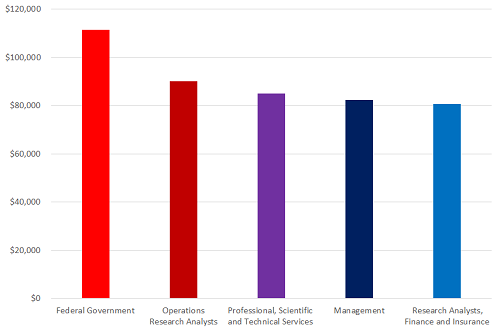If you’re interested in the field of operations research analysis, your future earning potential is just one of many factors to consider. Operations research analysts earn median wages more than twice as high as the median for all occupations, and six-figure salaries are possible for those in higher earning brackets. However, you should also know that the path to a role as an operations research analyst isn’t always the most straightforward. To get this high-paying math job, you may need to get creative when it comes to choosing what to study in college, make the challenging decision about whether or not to go to graduate school and continue your education throughout your career.
IMAGE SOURCE: Pixabay, public domain
Salary Ranges for Operations Research Analysts
The median annual wage for all operations research analysts in the United States is $81,390, the Bureau of Labor Statistics (BLS) reported. Median means that this is the midpoint salary among all U.S. workers in the operations research analyst occupation, across all levels of education and experience. Half of operations research analysts earn less than this wage, with the lowest paid 10 percent making under $45,270 per year. The other half of operations research analysts earn more than the median, and the highest paid 10 percent of operations research analysts make upwards of $134,470.
As in many other occupations, your industry of employment can have a major influence on how much money you make. Among the five industries that employ the most operations research analysts, median annual wages differ by as much as $30,000, according to the BLS. The federal government, which employs just five percent of operations research analysts, pays the most, with a median salary of $111,570. For the nine percent of operations research analysts who work in manufacturing, the median wage is $90,120. More than one in five operations research analysts work in professional, scientific and technical services, earning a median salary of $85,180. An $82,470 median salary awaits the nine percent of operations research analysts who work in management of companies and enterprises. The industry which employs the most operations research analysts, finance and insurance, offers a median salary slightly below that of all industries, at $80,800.
Though impressive, the salary for operations research analysts is slightly below the $84,060 median wage for all mathematical science occupations and well below the six-figure median wages for actuaries and mathematicians.
Becoming an Operations Research Analyst
A college education is necessary to be an operations research analyst, but choosing a major is not always easy. Few colleges and universities offer specialized degree programs in operations research at the undergraduate or even graduate degree level, the BLS reported. In those that do, the program is usually math-intensive. A student pursuing a bachelor’s degree in operations research will typically take classes in calculus, algebra, differential equations, probability, economics, computer science, data analytics and business. Part of the curriculum may focus on an academic track or concentration, often decision-making in specific systems or using specific approaches. At the graduate level, students are expected to have a strong background in mathematics already. The coursework for a master’s degree in operations research may focus more narrowly on simulations, optimization models and methods and stochastic, or randomly determined, models of data analysis.
What should you do if you want to be an operations research analyst, but none of your top-choice schools offer this specialized degree program? Just about any quantitative or technical field of study can be a suitable background for a job in operations research. Degrees in computer science, math, engineering or analytics, in particular, can help you prepare for this career, according to the BLS. Students who are sure that they want to work in operations research should work with advisors to determine the best courses for them to take in addition to their major requirements.
A bachelor’s degree is enough to get started in an entry-level operations research analyst role, but for more advanced roles or opportunities with more selective employers, you may need a master’s degree.
The Benefits of a Career in Operations Research Analysis
There are many reasons why students who are good at math should consider an operations research analyst career. For one thing, the occupation is seeing a much faster than average rate of job growth, with the BLS predicting a 27 percent increase in opportunities over just a decade. This rapid growth, combined with a shortfall of qualified analysts, will translate to a lot of opportunities for new operations research analysts. The “job explosion” will likely add 28,000 new jobs in the field.
Of course, there are other factors besides job security and outlook to consider, as well. The high salary is part of what makes this role appealing. This and other factors, such as a good work-life balance, are part of what lead to operations research analyst being ranked one of the best jobs in America.
The ideal candidates for a career in operations research will also enjoy the opportunity to put their analytical, math, critical-thinking and problem-solving skills to use in their work.
Additional Resources
What Is the Salary Potential for Someone with a Math Degree?
What Is the Salary Potential for Someone With an Actuarial Science Degree?
What Is the Salary Potential for Someone With a Mathematics Education Degree?




